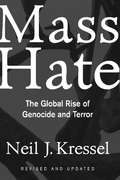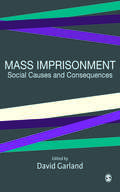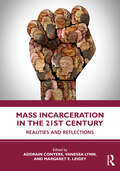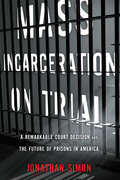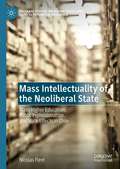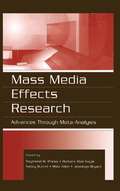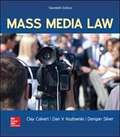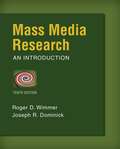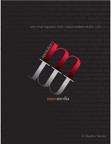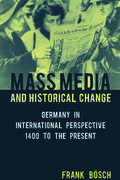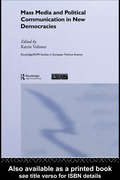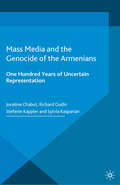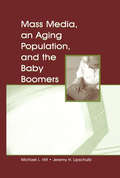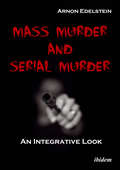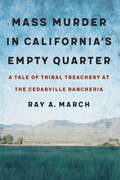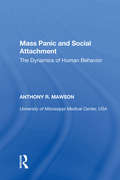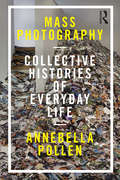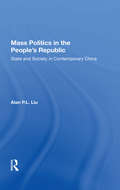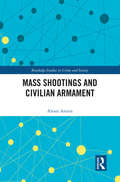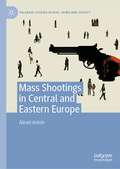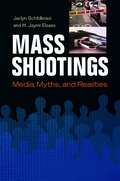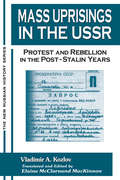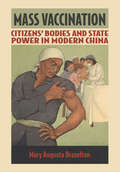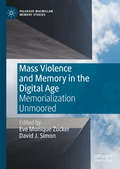- Table View
- List View
Mass Hate: The Global Rise of Genocide and Terror
by Neil J. KresselMass Hate explores why the brutality of humankind erupted and flowed more expansively in the twentieth century than ever before. Psychologist Neil Kressel recommends specific steps to help stem this bloody global tide of slaughter, terror and genocide. In his investigation, Kressel focuses on the horrifying butchery in Rwanda, the terrifying tactics of rape and torture of women in Bosnia, the systematic murder of Jews and others during the Holocaust. He examines history, psychology, and political science for explanations of what propels a citizen to raise a machete against innocent neighbors, and, in a moving conclusion, suggests practical ways for humankind to eradicate the causes of mass hate. Now included in the preface is a discussion of the terrorist attack of September 11, 2001, on New York and the Pentagon.
Mass Imprisonment: Social Causes and Consequences
by David W Garland`The quite extraordinary phenomenon of mass imprisonment in the USA needs, above all, to be identified.' David Garland and his excellent range of criminological contributors go well beyond this by showing how to start thinking (and arguing) about what these unprecedented statistics might mean for all modern societies' - Professor Stan Cohen, Department of Sociology, LSE This major new volume of papers by leading criminologists, sociologists and historians, sets out what is known about the political and penological causes of the phenomenon of mass imprisonment. Mass imprisonment, American-style, involves the penal segregation of large numbers of the poor and minorities. Imprisonment has become a central institution for the social control of the urban poor. Other countries are now looking to the USA to see what should be learned from this massive and controversial social experiment. This book describes mass imprisonment's impact upon crime, upon the minority communities most affected, upon social policy and, more broadly upon national culture. This is a book that all penologists and policy makers should read.
Mass Incarceration in the 21st Century: Realities and Reflections
by Margaret E. Leigey Addrain Conyers Vanessa LynnThis reader presents a comprehensive review of the research on mass incarceration as it relates to causes, impact, and solutions. Assembling contributions from leading experts in a variety of disciplines as well as the voices of directly impacted people, the editors have created a diverse collection of chapters addressing prison, punishment, incarceration, reentry, and reintegration embedded in the context of the ever-evolving discussion around ending mass incarceration.The effects of the exponential prison growth in the United States over more than 50 years have been catastrophic, resulting in disparities that especially plague the poor, communities of color, and women. Mass incarceration is a culmination of policies and practices that benefit the privileged praxis and consequently disproportionally disenfranchise marginalized communities. The ideology affects every stage of the criminal justice system, from policing to release, and this book meets the need to expand the examination beyond departments of corrections to explore the administration behind laws, biased practices, and an unforgiving societal stigma. It deepens comprehension and engagement with concise and accessible readings that offer nuance and provoke thought.The book is ideal as a primary or supplementary textbook for corrections, prisons, or penology courses, as well as courses focused on law, policy, sociology, social work, and social justice. It also will serve as a valuable reference book for any individual searching for knowledge on the past, present, and future of mass incarceration.
Mass Incarceration on Trial
by Jonathan SimonFor nearly forty years the United States has been gripped by policies that have placed more than 2.5 million Americans in jails and prisons designed to hold a fraction of that number of inmates. Our prisons are not only vast and overcrowded, they are degrading--relying on racist gangs, lockdowns, and Supermax-style segregation units to maintain a tenuous order.Mass Incarceration on Trial examines a series of landmark decisions about prison conditions--culminating in Brown v. Plata, decided in May 2011 by the U.S. Supreme Court--that has opened an unexpected escape route from this trap of "tough on crime" politics. This set of rulings points toward values that could restore legitimate order to American prisons and, ultimately, lead to the demise of mass incarceration. Simon argues that much like the school segregation cases of the last century, these new cases represent a major breakthrough in jurisprudence--moving us from a hollowed-out vision of civil rights to the threshold of human rights and giving court backing for the argument that, because the conditions it creates are fundamentally cruel and unusual, mass incarceration is inherently unconstitutional.Since the publication of Michelle Alexander's The New Jim Crow, states around the country have begun to question the fundamental fairness of our criminal justice system. This book offers a provocative and brilliant reading to the end of mass incarceration.
Mass Intellectuality of the Neoliberal State: Mass Higher Education, Public Professionalism, and State Effects in Chile (Palgrave Studies on Global Policy and Critical Futures in Education)
by Nicolas FleetThis book addresses the political effects of the massification of higher education and intellectual labor in the neoliberal state. Using the case of Chile, the author argues that public professionalism emerges in the mass university system, producing excesses of knowledge which infuse the state with political purpose at many levels. The emergence of the student movement in 2011, then the major social mobilization against the neoliberal state since the restoration of democracy in 1990, provided a clear manifestation of the politicization and ideological divisions of the mass university system. In conditions of mass intellectuality, public professionals mobilize their political affinities and links with society, eventually affecting the direction of state power, even against neoliberal policy. Through several interviews with academics, public professionals, and other documentary and statistical analyses, the book illustrates the different sites of political socialization and the ideological effectiveness of the emergent mass intellectuality of the neoliberal state.
Mass Media Effects Research: Advances Through Meta-Analysis (Routledge Communication Ser.)
by Raymond W. Preiss Barbara Mae Gayle Nancy Burrell Mike Allen Jennings BryantThis distinctive collection offers a unique set of meta-analyses covering the breadth of media effects research. Editor Raymond W. Preiss and his colleagues bring together an all-star list of contributors. Organized by theories, outcomes, and mass media campaigns, the chapters included here offer important insights on what current social science re
Mass Media Law
by Clay Calvert Dan Kozlowski Derigan Silver<p>In its twentieth edition, Mass Media Law comprehensively examines the principles of media law, First Amendment freedoms of speech, and press and assembly. This timely revised edition is extremely pertinent in this era of both “fake news” and open hostility by some politicians toward the press. Students are offered an updated look at the ever-changing landscape of media law. Led by a team of preeminent scholars in the field of mass media law: Clay Calvert, Dan Kozlowski and Derigan Silver, this new edition is engaging, readable, and entertaining. <p>Instructors and students can now access their course content through the Connect digital learning platform by purchasing either standalone Connect access or a bundle of print and Connect access. McGraw-Hill Connect® is a subscription-based learning service accessible online through your personal computer or tablet. Choose this option if your instructor will require Connect to be used in the course.</p>
Mass Media Research: An Introduction
by Joseph R. Dominick Roger D. WimmerIt shows you how it happens--from content analysis to surveys to experimental research--and then equips you with expert tips on analyzing the media you encounter in your daily life. Reflecting the latest developments from the field, this popular book delivers a comprehensive overview of mass communication research and a thorough exploration of each major approach--including qualitative research, content analysis, survey research, longitudinal research, and experimental research.
Mass Media Revolution
by J. Charles SterinDebuting in its first edition Mass Media Revolution is a revolutionary learning and teaching tool designed to reflect the way students experience mass media today. With a storytelling narrative and chapter-specific videos,Mass Media Revolution helps students experience mass media, enhancing their development as critical consumers. They can study, read, interact and consume their course material in print and online in a way that best suits their individual learning needs
Mass Media and Historical Change: Germany in International Perspective, 1400 to the Present
by Frank BöschMedia influenced politics, culture, and everyday life long before the invention of the Internet. This book shows how the advent of new media has changed societies in modern history, focusing not on the specifics of technology but rather on their distribution, use, and impact. Using Germany as an example for international trends, it compares the advent of printing in Europe and East Asia, and the impact of the press on revolutions, nation building, and wars in North America and Europe. The rise of tabloids and film is discussed as an international phenomenon, as the importance of media during National Socialism is looked at in comparison with Fascist Italy and Spain. Finally, this book offers a precise analysis of media during the Cold War, with divided Germany providing the central case study.
Mass Media and Political Communication in New Democracies (Routledge/ECPR Studies in European Political Science #Vol. 42)
by Katrin VoltmerThis book examines how political communication and the mass media have played a central role in the consolidation of emerging democracies around the world. Covering a broad range of political and cultural contexts, including Eastern and Southern Europe, Latin America, Asia and Africa, this new volume investigates the problems and conflicts arising in the process of establishing an independent media and competitive politics in post-autocratic societies. Considering the changing dynamic in the relationship between political actors, the media and their audience, the authors of this volume address the following issues: changing journalistic role perceptions and journalistic quality the reasons and consequences of persisting instrumentalization of the media by political actors the role of the media in election campaigns the way in which the citizens interpret political messages and the extent to which the media influence political attitudes and electoral behaviour the role of the Internet in building a democratic public sphere This book will be of great interest to all those studying and researching democracy and democratization, comparative politics, political communication, journalism, media and the Internet.
Mass Media and the Genocide of the Armenians: One Hundred Years of Uncertain Representation (Palgrave Studies in the History of Genocide)
by Stefanie Kappler Joceline Chabot Richard Godin Sylvia KasparianThe role of the mass media in genocide is multifaceted with respect to the disclosure and flow of information. This volume investigates questions of responsibility, denial, victimisation and marginalisation through an analysis of the media representations of the Armenian genocide in different national contexts.
Mass Media, An Aging Population, and the Baby Boomers (Routledge Communication Series)
by Jeremy H. Lipschultz Michael L. HiltAs the oldest members of the baby boomer generation head into their retirement years, this demographic shift is having a substantial influence on uses of mass media, as well as the images portrayed in these media. Mass Media, An Aging Population, and the Baby Boomers provides a comprehensive examination of the relationship between media and aging issues, addressing mass media theory and practice as it relates to older Americans.Reviewing current research on communication and gerontology, authors Michael Hilt and Jeremy Lipschultz focus on aging baby boomers and their experiences with television, radio, print media, entertainment, advertising and public relations, along with the Internet and new media. They draw from studies about health and sexuality to understand views of aging, and present a view of older people as important players in the political process. Hilt and Lipschultz conclude the volume by addressing trends and making predictions related to baby boomers and mass media.Providing a timely and insightful examination of the linkage between mass media and aging issues, this volume will prove a valuable resource for scholars and students in media and gerontology. It is intended for use in coursework addressing such topics as mass communication and society, media and aging, media and public opinion, sociology, and social gerontology.
Mass Murder and Serial Murder: An Integrative Look
by Arnon EdelsteinWhile “Mass murder” refers to the murder of several people at the same time, "serial murder" describes several killings by the same perpetrator in a repetitive pattern. Usually these incidents count a high toll of victims and create significant anxiety in the public. Yet, the rate of finding murderers in these cases is relatively very low, especially in serial murders; that is if they are ever caught at all. Arnon Edelstein examines the various categories of mass murder and serial murder and suggests a new category: “mass-serial murder”. He presents and criticizes the most up-to-date research and theoretical literature in the field and suggests an integrative theoretical model. This groundbreaking volume is intended for criminologists, psychologists, sociologists, students, and readers who are interested in truly understanding the complicated aspects of this fascinating field of investigation.
Mass Murder in California's Empty Quarter: A Tale of Tribal Treachery at the Cedarville Rancheria
by Ray A. MarchMass Murder in California&’s Empty Quarter exposes a story of mass murder, a community&’s racism, and tribal treachery in a small Paiute tribe. On February 20, 2014, an unseasonably warm winter day for the little agriculture town of Alturas, California, Cherie Rhoades walked into the Cedarville Rancheria&’s Paiute tribal offices. In the space of nine minutes she killed four people and wounded two others using two 9mm semiautomatic handguns. In that time she slayed half of her immediate family and became only the second woman, and the first Native American woman, to commit mass murder in the United States. Ray A. March threads the story through the afternoon of the murders and explores the complex circumstances that led to it, including conditions of extreme economic disparity, privations resulting from tribal disenrollment, ineptness at the Bureau of Indian Affairs, and family dysfunction coupled with a possible undiagnosed mental illness. This account of the tragic murders and the deplorable conditions leading up to them shed light on the formidable challenges Native Americans face in the twenty-first century as they strive to govern themselves under the guise of U.S.-sanctioned sovereignty.
Mass Notification and Crisis Communications: Planning, Preparedness, and Systems
by Denise C. WalkerMass communication in the midst of a crisis must be done in a targeted and timely manner to mitigate the impact and ultimately save lives. Based on sound research, real-world case studies, and the author‘s own experiences, Mass Notification and Crisis Communications: Planning, Preparedness, and Systems helps emergency planning professionals create
Mass Panic and Social Attachment: The Dynamics of Human Behavior
by Anthony R. MawsonHow do humans behave when under threat of attack or disaster? How does the social context affect individual behavior? Anthony Mawson provides an illuminating examination of individual and collective behavior under conditions of stress and danger, in response to both natural and manmade threats and disasters. Opening with a question about the interpretation of "mass panic" in combat , the book gradually unfolds into a multidisciplinary analysis of the psychobiological basis of social relationships and the neural organization of motivation and emotion. Mawson provides a comprehensive review and synthesis of the mass panic and disaster literature and offers a social attachment model, that recognizes the fundamentally gregarious nature of human beings and the primacy of attachments. He argues that the typical response to threat and danger is neither fight nor flight, nor social breakdown, but increased affiliation and camaraderie. This book is unique in addressing the behavioral and social aspects of threat and disaster. It will appeal to social scientists across a range of disciplines, to public administrators, and to disaster and public health professionals.
Mass Photography: Collective Histories of Everyday Life (International Library Of Visual Culture Ser.)
by Annebella PollenWith increasingly accessible camera technology, crowdsourced public media projects abound like never before. Such projects often seek to secure a snapshot of a single day in order to establish communities and create visual time capsules for the future. Mass Photography: Collective Histories of Everyday Life assesses the potential of these popular moment-in-time projects by examining their current day prevalence and their historical predecessors. Through archival research and interviews with organisers and participants, it examines, for the first time, the vast photographic collections resulting from such projects, analysing their structures and systems, their aims and objectives, and their claims and promises. The central case study is the 55,000 photographs submitted to One Day for Life in 1987, which aimed, in its own time, to be ‘the biggest photographic event the world had ever seen’.
Mass Politics In The People's Republic: State And Society In Contemporary China
by Alan P.L. LiuExploring the crucial link between state and society in the People's Republic of China (PRC), this book analyzes the interaction between the Chinese Communist Party and the country's major social groups. It explores how public opinion contributes to a mass political culture in China.
Mass Shootings and Civilian Armament (Routledge Studies in Crime and Society)
by Alexei AnisinMass Shootings and Civilian Armament provides the first comprehensive multi-methodological analysis of the relationship between mass shootings and firearm purchases (as proxied by background checks) in the US on national level data from 1999-2020. Since 1994, the number of civilian-owned firearms in the US has doubled to around 398 million while the population only grew by 70 million. On average, mass shootings have occurred once every two weeks over the last decade which is a major factor behind why social scientists have started to ask whether mass shootings play a causative role in civilian decisions to purchase guns. Utilizing a multi-methodological approach featuring quantitative, comparative/configurational, and qualitative methods, this book puts forward a theoretical framework and argues that mass shootings do increase civilian armament, but that this repetitious effect is historically contingent, asymmetric, and non-linear. Particular types of mass shootings are hypothesized to have driven and continue to bring about increased levels of civilian firearm purchases through different pathways and combinations of variables – those that feature high fatality counts; arise in areas of cultural importance, are ideologically motivated. First, inquiry into background check data (1999-2020) and data on 213 mass shootings and attempted mass shootings is carried out to find out which shootings (as well as controls) are significantly correlated with background check increases. Second, the findings are utilized in a theoretically driven comparative configurational assessment to test if the noted theoretical pathways are associated with the outcome of increased post-shooting armament. Third, the empirical analyses are complimented by three case studies – the 2011 Gabrielle Giffords shooting (illustrative of the high fatality pathway), the 2012 Colorado movie theater shooting (illustrative of the cultural pathway), and the 2015 Charleston Church shooting (illustrative of the ideologically driven pathway). Interdisciplinary in nature, Mass Shootings and Civilian Armament will not only be of great interest to scholars of Criminology, but will also speak to sociologists, economists, public policy scholars, political scientists, historians, as well as cultural studies and American studies scholars.
Mass Shootings in Central and Eastern Europe (Palgrave Studies in Risk, Crime and Society)
by Alexei AnisinThis book examines mass shootings and attempted shootings that occurred across 16 countries in Central and Eastern Europe, known as post-communist states. This region of the world has been described by social scientists as possessing specific social, cultural, and political characteristics which may mean that mass shootings in this part of the world are driven by distinct causal factors in comparison to those in North America and elsewhere. This book explores trends and patterns that underpin cases in this under-explored region and tests whether Cumulative Strain Theory can account for mass shooting occurrences. It uses in-depth qualitative analysis to examine select case studies in one chapter, followed by a chapter which uses quantitative methods to identify trends across a wider set of cases and to test the theoretically-driven hypotheses. This data is then compared with data in the US. This book draws on a wide range of media, forensic and court reports and provides methodological insights and discussions of future trends including the potential incidental increase of mass shootings in these regions. It also engages in recent public policy debates pertaining to firearm ownership and regulation.
Mass Shootings: Media, Myths, and Realities (Crime, Media, and Popular Culture)
by Jaclyn Schildkraut H. Jaymi ElsassWhen a mass shooting happens, the news media is flooded with headlines and breaking information about the shooters, victims, and acts themselves. What is notably absent in the news reporting are any concrete details that serve to inform news consumers how prevalent these mass shootings really are (or are not, when considering crime statistics as a whole), what legitimate causes for concern are, and how likely an individual is to be involved in such an incident. Instead, these events often are used as catalysts for conversations about larger issues such as gun control and mental health care reform.
Mass Uprisings in the USSR: Protest and Rebellion in the Post-Stalin Years
by V. A. Kozlov Elaine McClarnandUntil recent times, incidents of mass unrest in the USSR were shrouded in official secrecy. Now this pioneering work by historian Vladimir A. Kozlov has opened up these hidden chapters of Soviet history. It details an astonishing variety of widespread mass protest in the post-Stalin period, including workers' strikes, urban riots, ethnic and religious confrontations, and soldiers' insurrections. Kozlov has drawn on exhaustive research in police, procuracy, KGB, and Party archives to recreate the violent major uprisings described in this volume. He traces the historical context and the sequence of events leading up to each mass protest, explores the demographic and psychological dynamics of the situation, and examines the actions and reactions of the authorities. This painstaking analysis reveals that many rebellions were not so much anti-communist as essentially conservative in nature, directed to the defense of local norms being disturbed by particular instances of injustice or by the rash of Krushchev-era reforms. This insight makes the book valuable not only for what it tells us about postwar Soviet history, but also for what it suggests about contemporary Russian society as well as popular protests in general.
Mass Vaccination: Citizens' Bodies and State Power in Modern China (Studies of the Weatherhead East Asian Institute, Columbia University)
by Mary Augusta BrazeltonWhile the eradication of smallpox has long been documented, not many know the Chinese roots of this historic achievement. In this revelatory study, Mary Augusta Brazelton examines the PRC's public health campaigns of the 1950s to explain just how China managed to inoculate almost six hundred million people against this and other deadly diseases.Mass Vaccination tells the story of the people, materials, and systems that built these campaigns, exposing how, by improving the nation's health, the Chinese Communist Party quickly asserted itself in the daily lives of all citizens. This crusade had deep roots in the Republic of China during the Second Sino-Japanese War, when researchers in China's southwest struggled to immunize as many people as possible, both in urban and rural areas. But its legacy was profound, providing a means for the state to develop new forms of control and of engagement. Brazelton considers the implications of vaccination policies for national governance, from rural health care to Cold War-era programs of medical diplomacy. By embedding Chinese medical history within international currents, she highlights how and why China became an exemplar of primary health care at a crucial moment in global health policy.
Mass Violence and Memory in the Digital Age: Memorialization Unmoored (Palgrave Macmillan Memory Studies)
by David J. Simon Eve Monique ZuckerThis volume explores the shifting tides of how political violence is memorialized in today's decentralized, digital era. The book enhances our understanding of how the digital turn is changing the ways that we remember, interpret, and memorialize the past. It also raises practical and ethical questions of how we should utilize these tools and study their impacts. Cases covered include memorialization efforts related to the genocides in Rwanda, Cambodia, Europe (the Holocaust), and Armenia; to non-genocidal violence in Haiti, and the Portuguese Colonial War on the African Continent; and of the September 11 attacks on the United States.
